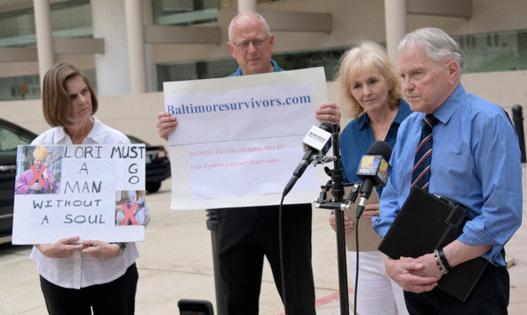Sex abuse survivors encourage more lawsuits against archdiocese before cap deadline
Published in Religious News
BALTIMORE — Sex abuse survivors scoffed at the Archdiocese of Baltimore’s claim of “charitable immunity” in bankruptcy court and encouraged others Wednesday to sue the church before financial damages face new limits next month.
“Just when you think you may be reaching the end of the Catholic Church’s road of hypocrisy, they find a way to pave another 50 miles,” survivor Frank Schindler told reporters outside the U.S. Bankruptcy Court in Baltimore.
Schindler’s comments, and those of other victims and advocates, came less than a week after a U.S. Bankruptcy Judge allowed church survivors to file and serve civil claims until May 31. Under a new law, cases filed after that will face a $700,000 cap on damages, instead of the current $1.15 million ceiling.
Because the archdiocese filed for bankruptcy in 2023, victims have not been allowed to sue the church for over a year and a half. Instead, roughly 1,000 people have been rerouted from state court to bankruptcy court, where negotiations have stalled.
But the judge’s May 2 decision, which lists hundreds of applicable churches, schools and charities covered by the archdiocese’s insurance policies, temporarily opened the door for those claimants to launch a civil case.
New claims will be paused until the resolution of the bankruptcy proceedings. Some survivors, however, worry that the church’s “forever-stalling tactics,” such as the charitable immunity claim, are “taking a toll on everyone’s patience.”
Maryland’s charitable immunity doctrine grants some legal protections to charitable organizations, including those providing religious services, in civil lawsuits if the organization has no liability insurance covering the “underlying harm or injury,” according to the Thurgood Marshall State Law Library. The idea is that donations should go toward the charity’s mission, not “pay the organization’s civil damage awards.”
“If we don’t see some real action, and soon, Judge [Michelle] Harner might just end the bankruptcy filing altogether. The bankruptcy could be dismissed,” said survivor and attorney Teresa Lancaster. “Then everyone can file suit in civil court the way we should have been able to before the archdiocese filed their bogus bankruptcy.”
In an interview, Lancaster said, “everyone’s still going to have a valid claim,” even if the bankruptcy is dismissed, but that compensation will depend on who wants to “fight it out.”
Days before the Child Victims Act of 2023 became law, erasing the statute of limitations on child sex abuse claims, the church filed for bankruptcy, effectively shielding itself from a mountain of expected lawsuits. At the time, Archbishop William E. Lori said the decision would allow the archdiocese to advance its two goals: “the healing of victim-survivors” and continuing its “many ministries.”
In a statement Wednesday, church spokesperson Christian Kendzierski said the archdiocese was “surprised” by the deadlock the charitable immunity idea created, given their “longtime practice of pastoral care and history of settlements with victim survivors” before now.
“The Archdiocese remains committed to providing equitable compensation to victim survivors and ensuring the continued mission and ministry of parishes and schools to the communities they serve and will continue to proceed while honoring its dual goals,” Kendzierski said.
But survivors argued the church’s bankruptcy attempt and related “underhanded” tactics have done the opposite.
“It is still the same old church it has always been,” Schindler said, “the church that continues to abuse survivors, turn its back on us, take advantage of our good faith attempts to obtain justice and demonstrate how they ignore the trauma they have inflicted.”
__________
©2025 Baltimore Sun. Visit baltimoresun.com. Distributed by Tribune Content Agency, LLC.









Comments